Q&A: Mark Mykleby, Natl Security=Sustainability
Written on April 8th, 2013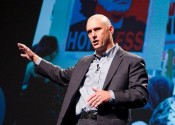 |
Aired: 04/07/13
In the preface to an article entitled A National Strategic Narrative, Anne-Marie Slaughter of Princeton says we need a narrative that confronts some of the following questions, “Where is the United States going in the world? How can we get there? What are the guiding stars that will illuminate the path along the way? We need a story with a beginning, middle, and projected happy ending that will transcend our political divisions, orient us as a nation, and give us both a common direction and the confidence and commitment to get to our destination.” She also writes, “In one sentence, the strategic narrative of the United States in the 21st century is that we want to become the strongest competitor and most influential player in a deeply inter-connected global system, which requires that we invest less in defense and more in sustainable prosperity and the tools of effective global engagement.”
Over time, the best way to shape the force of the future is to invest in the science, technology, education, and training that will equip our soldiers, sailors, airmen, and marines to adapt to an increasingly complex and dynamic environment. The hardware and software we buy and build are secondary to the gray matter we must cultivate now.
When I hear that someone high up in the military is talking seriously about sustainability, I take notice.
www.newamerica.net
Q&A: Social Entrepreneurs-Creating Good Work
Written on March 25th, 2013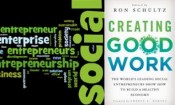 |
|
Aired: 03/24/13
This week I’m joined by RON SCHULTZ, editor of a new book, CREATING GOOD WORK, that brings together essays by social entrepreneurs that share their experiences as well as their insights and advice for others. Ron has invited a few of his book’s contributors (PAUL HERMAN, founder/CEO HIP Investor Inc; JIM FRUCHTERMAN, founder/CEO Benetech; CARRIE FREEMAN, Second Muse, formerly Intel) to join us, and I want to tap each person’s individual story while asking some of these bigger questions —
What is a social entrepreneur? What’s working in the field? Why is it working? What is the larger goal or vision? Why is social entrepreneurship important? What are the big challenges? What lessons have they learned? Where can listeners learn more?
I hope someone new to the concept will understand what we’re talking about and a knowledgeable listener will learn things they can put to use.
www.creatinggoodwork.com
www.benetech.org
www.secondmuse.com
www.hipinvestor.com
Q&A: MICHAEL LIND, Co-founder of the New America Foundation; Author of LAND OF PROMISE: An Economic History of the United States
Written on March 17th, 2013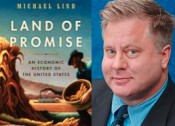 |
Aired: 03/17/13
This week’s guest, MICHAEL LIND, has written an economic history of the United States. In his new book, LAND OF PROMISE, he lays out a pattern in which the US has reinvented itself economically and politically a number of times based on the emergence of new technologies. From wind and water, to steam, to electricity and internal combustion, and finally the computer.
Each new dominant technology overwhelms the existing political and regulatory system and American government lags a generation or two behind technology-induced economic change. It takes a crisis or a war or both to overthrow the old regime and usher in the new.
When the U.S. economy has flourished, Lind argues, government, business, labor and universities have worked together as partners in a project of economic nation building. Today, as the United States struggles to emerge from the Great Recession, Land of Promise says that Americans, since the earliest days of the republic, have repeatedly reinvented the American economy-and have the power to do so again.
Q&A: Dave Zirin, Author- GAME OVER and Sports Editor for The Nation
Written on February 19th, 2013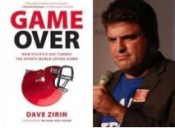 |
AIRED 02/17/13:
This week’s guest is DAVE ZIRIN. Dave is the first sports editor for The Nation magazine. He has for years in books, columns, and commentaries examined both the politics of sports as well as the intersection of the two.
Howard Cosell said “rule number one of the jockocracy” was that sports and politics don’t mix. In his newest book, Game Over, Zirin asserts that modern professional athletes are breaking that rule like never before. From the NFL lockout and the role of soccer in the Arab Spring to the Penn State sexual abuse scandals and Tim Tebow’s on-field genuflections, Dave reveals how our most important debates about class, race, religion, sex, and political power are being played out both on and off the field.
I’ve left my overzealous interest in sports out of the studio for years, but this week — a couple of weeks after the Super Bowl, not long after Lance Armstrong finally admits to doping, and a few hours before the NBA All Star game – I break that barrier. Dave Zirin and I will talk about specific events and athletes, but we’ll also examine the role sports plays in our individual lives and in society.
www.edgeofsports.com
Q&A: EMAD BURNAT and GUY DAVIDI, Co-Directors – 5 BROKEN CAMERAS
Written on February 11th, 2013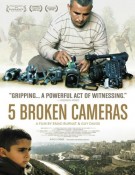 |
Aired: 02/10/13
The Academy Awards will be given out in two weeks and we are lucky to have the co-directors of one of the nominated films with us today. 5 BROKEN CAMERAS, one of five nominees for best documentary, tells the story of a Palestinian farmer who lives with his wife and four small children in the village of Bil’in, in the central West Bank.
EMAD BURNAT got his first camera in 2005, when his youngest son, Gibreel, was born. Almost simultaneously, the Israeli army began building a separation wall between Bil’in and a nearby Israeli settlement, separating residents from the olive tree groves that are their livelihood. Burnat turned his camera on his fellow villagers as they responded with nonviolent protests, including marches to the wall every Friday. I am joined in the studio today by Burnat and his Israeli co-director, GUY DAVIDI.
Structured in chapters around the destruction of each one of Burnat’s cameras, we witness Gibreel grow from a newborn baby into a young boy, as from behind the lens Burnat watches as olive trees are bulldozed and protests intensify in this cinematic diary of life in the West Bank.
Upon hearing of the Oscar nomination for their film, EMAD BURNAT stated, “The truth is powerful, it can heal. I hope this film can help heal misunderstanding about us. A filmmaker’s dream is winning an Oscars® however my dream is freedom for Palestine, we all have lots of work to do.”
And the words of Co-director GUY DAVIDI, “I am hopeful this will be a milestone on the road to ending the occupation and securing a brighter and more just future for Palestinians and Israelis.”
